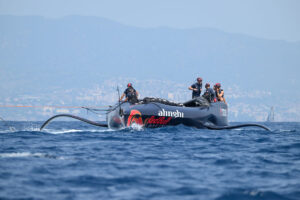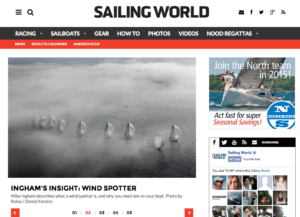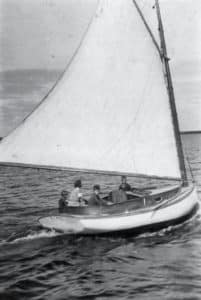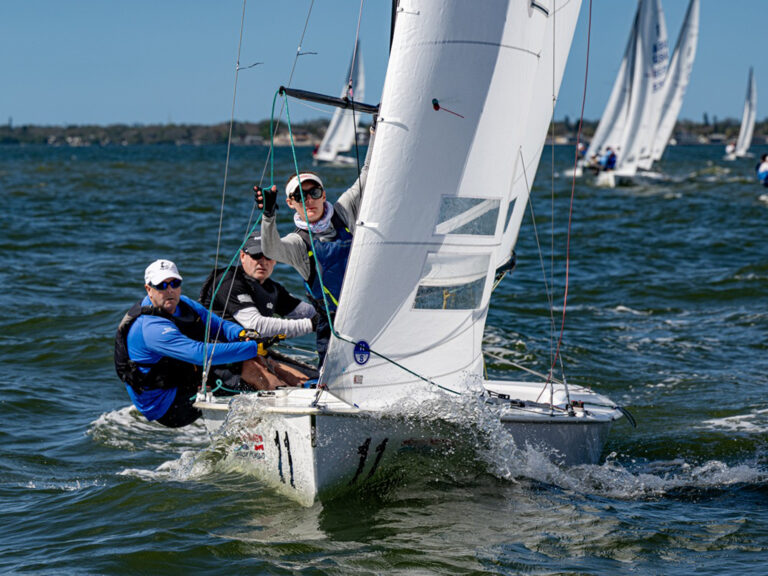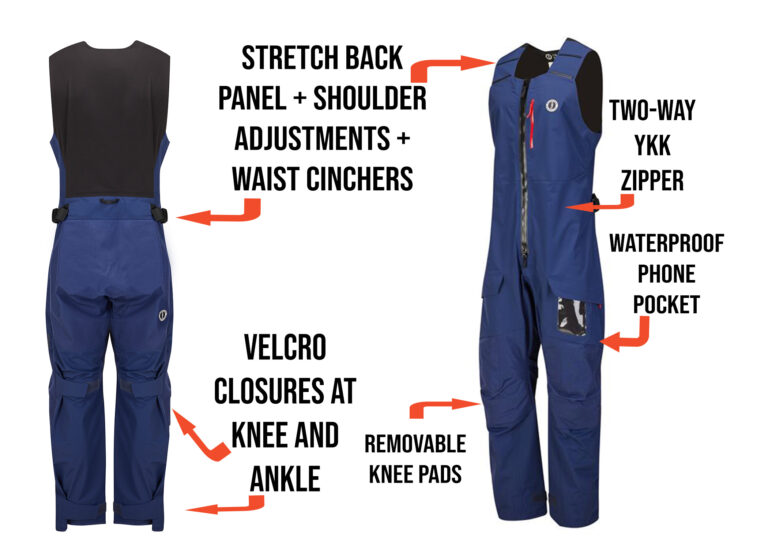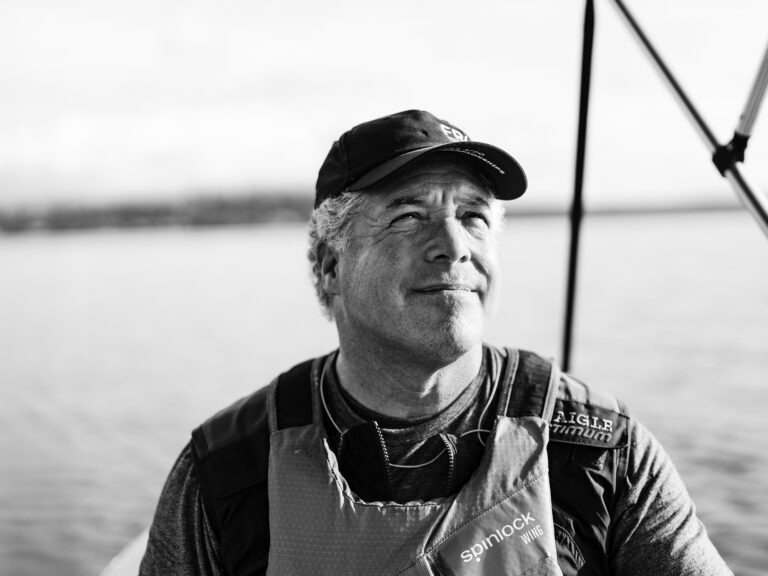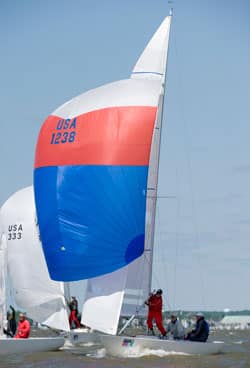
Jobson Report
After a winter with too much travel and too little sailing, it felt great to splash my Etchells in my hometown for the Sperry Top-Sider Annapolis NOOD in late April. It felt even better to have a great result, finishing the weekend with five firsts and three more finishes in the top-five. Immense credit for the victory, of course, goes to my crew Jud Smith and Dave Askew.
After we won, a friend called to offer his Bravo Zulu, “Nice going, except for the fifth,” he said. His ribbing made me chuckle because that fifth-place finish was, in hindsight, our best and most important race.
Sometimes winning a race is easy, especially when you pop into the lead after a good start or luck into a miracle windshift. But when you’re well back in the pack, that’s when you’re really challenged, and dealing well with this adversity is often how you win regattas.
Let’s revisit that fifth-place finish: In this race, the fifth of the series, we had an adequate start and rounded the windward mark second of 12 boats. But the wind shifted, and we were late to respond with a jibe. Every boat behind us promptly jibed with the shift and suddenly we found ourselves staring down the backside of the fleet. Ouch.
To make matters worse, the boat in second in the regatta at that point was winning the race. But Jud was brilliant as we approached the leeward gate, declaring, “Here’s what we’re going to do: we’re going to round last, and then start the race over.”
He delivered his strategy with his typical humor, which helped me mentally recover from blowing a good position. By the time we turned upwind for the third of five legs, our Etchells fleet had caught the 38 J/22s sailing ahead of us. To add to the confusion, the wind strength was dropping, and the shifts were more erratic than ever. We knew there’d be plenty of opportunities to pass boats.
When you find yourself in this position, it’s always tough to decide between sailing in disturbed wind and staying on a big lift, or tacking away to sail in clear air, but headed and sailing toward the wrong side of the course. We decided to work the lifts and ignore the bad air. It was good a strategy. Within a few minutes we had passed five boats, and at the next windward mark we jibed immediately. On the run, we were able to pass another boat. Meanwhile, our rival got tangled up with the J/22 fleet and missed a few windshifts. On the final leg to windward, we moved into fifth while our chief competitor ended up in seventh. A positive attitude, confusion from another fleet, and erratic winds saved our race.
College sailors learn that maintaining a good, consistent average is the key to success. In the 2009 and 2010 ICSA Spring Coed Nationals, the winning team averaged a fifth in an 18-boat fleet. And it’s no accident that Anna Tunnicliffe and Zach Railey, America’s two Olympic medalists in 2008, won their medals without winning a single race. The enduring lesson is to avoid big risks. For me, the real challenge in accomplishing this is clearing my head after adversity strikes. It’s easy to get upset and start agonizing over what went wrong, but that’s why Jud’s encouragement when we lost the lead was both soothing and helpful. After recovering mentally, the next step is to quickly make a plan.
The best time to plan this recovery is before the next leg starts. If things look ugly, accept your fate and get planning. Think through which side of the course has more wind. If a boat made a substantial gain on one side earlier in the race, consider whether the pattern will repeat itself.
Last summer, for example, I raced in a catboat regatta. On the last leg to windward of the first race, I witnessed one boat sail from last into fourth. No one else seemed to notice this big gain. About 15 minutes later, a second race started and I sailed off in the direction where this team had made its big gain. I found stronger wind and favorable current, and we led at the first mark and held on to win. Staying alert paid off.
One of sailing’s most enduring tactical conundrums is when to split with the fleet and take a flyer. In my experience, flyers rarely pay. Ask yourself this question: Should you split with the fleet to make a big advance and risk losing many boats, or chip away at the fleet by trying to pass one boat a time? If you adhere to the philosophy of going for a good, consistent average, then I suggest staying with the fleet as the best path. But if you see stronger wind or favorable current, and you’re confident either or both will be there when you get there, then I suggest you go for it.
Maintaining a positive attitude during a race is essential. In the NOOD regatta we had two moments that could’ve turned bad, but a quick acknowledgment of our mistakes calmed our crew. The first was jumping the gun at the start—we didn’t think we were over, but who ever does? The first step in this situation is to flush bad thoughts out of your head so you can make a quick recovery. After restarting we noticed we were on a big port lift, while the rest of the fleet was still on starboard tack, as is typical for the first few minutes after a start. A few minutes later, the wind veered and we tacked. In an instant we were back among the leaders. Had we wasted time and mental energy complaining, we would have been too preoccupied to notice the wind pattern. A few races later we made the mistake of splitting with our two closest rivals (on points). Sure enough, we paid dearly as the rivals found better wind and took the lead. Once again, Jud simply said, “My mistake.” That was it, and we went to work to make up ground.
When you’re trying to work your way back, focus on one thing at a time. Compare your boatspeed with the other boats around you. Make one adjustment at a time to see what works. One person on the crew should watch what the competition is doing. Make mental notes on who is gaining. When the weather gets wacky, take the attitude that there are more opportunities to pass. A good attitude during times of adversity will help you earn that good, consistent average. And, as it was for us, sometimes the worst finish in a regatta will be your best race.

